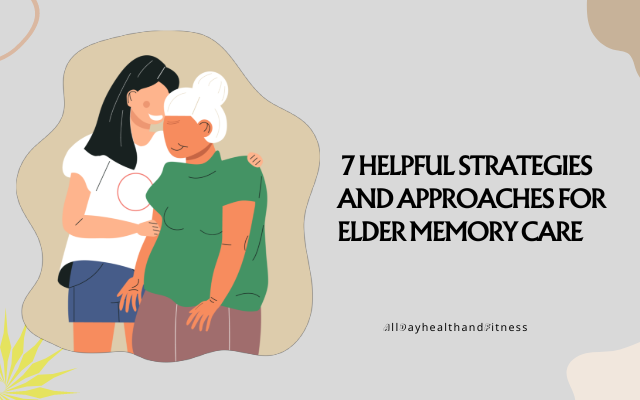7 Helpful Strategies and Approaches for Elder Memory Care

Understanding and implementing successful ways of providing memory care for older adults is becoming an increasingly important concern as our population ages.
Empathy, patience, and specialized knowledge are needed to provide the best care for older adults struggling with memory challenges.
This post is dedicated to analyzing seven crucial techniques and methods that can positively impact the cognitive well-being of your senior loved ones.
Table of Contents
- 1. Creating An Atmospheric Habitat That Is Both Safe And Familiar
- 2. Participating In Mentally Challenging Activities
- 3. Making Adequate Nutritional Support A Top Priority For Brain Health
- 4. Participating In Physical Activity Consistently
- 5. Engaging In Meaningful Social Interactions And Relationships
- 6. Making Use Of The Power That Music And Art Therapy Have To Offer
- 7. Seeking Assistance Of Qualified Professionals And Subject-Matter Experts
- Conclusion
1. Creating An Atmospheric Habitat That Is Both Safe And Familiar
Creating a living environment that is both secure and comfortable for the older adult receiving memory care is one of the fundamental caregiving strategies.
The comfort of familiarity and routine can be a great source of peace for older adults who struggle with memory issues. You can aid in the reduction of confusion and anxiety in the individual by decluttering, organizing, and otherwise improving the quality of their living environment.
Because they can jog fond memories and instill a feeling of belonging, it is important to incorporate familiar objects and images with sentimental value into your space.
2. Participating In Mentally Challenging Activities

Regularly participating in mental challenges is an absolute requirement for maintaining mental agility. Participation in activities such as crossword puzzles, memory games, and reminiscence therapy might provide essential mental stimulation for an individual.
Moreover, participating in such activities not only fosters a sense of belonging but also brings forth a multitude of positive effects on their physical, mental, and emotional well-being.
These exercises stimulate brain plasticity, which helps keep cognitive functions active and lowers the risk of cognitive decline with advancing age.
3. Making Adequate Nutritional Support A Top Priority For Brain Health
When providing care for seniors, diet is a very important consideration to make. Consuming a diet that is rich in antioxidants, omega-3 fatty acids, and essential vitamins is vital in order to keep one’s brain in good health and to ensure proper brain function.
There is mounting evidence that consuming particular foods, such as blueberries, walnuts, and fatty fish, can have a positive effect on one’s mental health.
It is highly recommended to collaborate with an experienced nutritionist in order to establish a bespoke eating strategy that is geared to match the particular requirements of the person you are caring for.
4. Participating In Physical Activity Consistently
Working out the muscles in your body has obvious beneficial impacts on your physical health, but it also has significant beneficial effects on your mental state. These benefits are compounded when you combine the two.
Walking and other forms of low-impact exercise, such as yoga and Pilates, should be promoted on a daily basis because studies have shown that these types of exercise considerably boost cognitive abilities.
These exercises increase the volume of blood that is sent to the brain, which in turn promotes the formation of new neurons, which ultimately leads to an increase in one’s cognitive capacity.
5. Engaging In Meaningful Social Interactions And Relationships

Those who are elderly and live alone may find their memory issues grow much more serious. It is crucial to one’s mental and emotional health to have meaningful connections with other people. This is true for both emotional and mental health.
Organizing get-togethers with friends and family, enrolling them in local senior groups, or encouraging their participation in community events are all great ways to provide seniors with the positive social connections essential for brain stimulation and emotional fulfillment.
These activities can be accomplished through the use of a variety of different methods.
6. Making Use Of The Power That Music And Art Therapy Have To Offer
Memory care for older people has seen considerable advancements in the past few years, particularly in art and music therapy. Music can awaken memories and stir up sentiments, which stimulates various brain sections and helps strengthen cognitive connections.
Art therapy, on the other hand, offers patients an outlet for the creative energy they have been storing up, stimulates self-expression, and has the potential to result in a feeling of accomplishment.
7. Seeking Assistance Of Qualified Professionals And Subject-Matter Experts
Navigating elder memory care demands thoughtful strategies. Professional assistance becomes a cornerstone in ensuring a higher quality of life for seniors facing cognitive challenges.
Care providers adept in memory care techniques offer tailored support that includes cognitive exercises, emotional engagement, and personalized care plans. Additionally, activities for seniors in assisted living settings, such as memory-enhancing games and social interactions, play a pivotal role.
With a combination of expert guidance and purposeful activities, seniors can maintain cognitive function, emotional well-being, and a sense of belonging in their communities.
Conclusion
A holistic and compassionate approach is required to care for older patients experiencing memory difficulties effectively. You will be able to considerably improve both their cognitive well-being and overall quality of life.
Remember that each individual is one of a kind, and adapt these tactics to meet the tastes and requirements of the person you care about the most.
About The Author:
Emma Davis is an enthusiastic writer who focuses on the fascinating realm of health and fitness. She is deeply committed to encouraging people to lead balanced and active lives. Throughout her career, Emma Davis has devoted herself to assisting individuals in attaining optimal well-being through her captivating and enlightening freelance writing.





